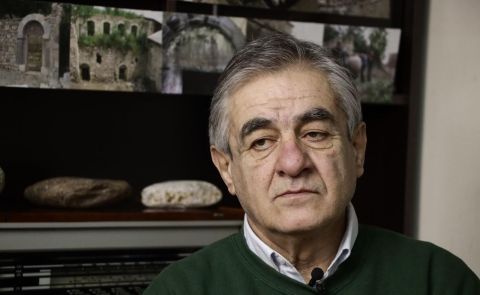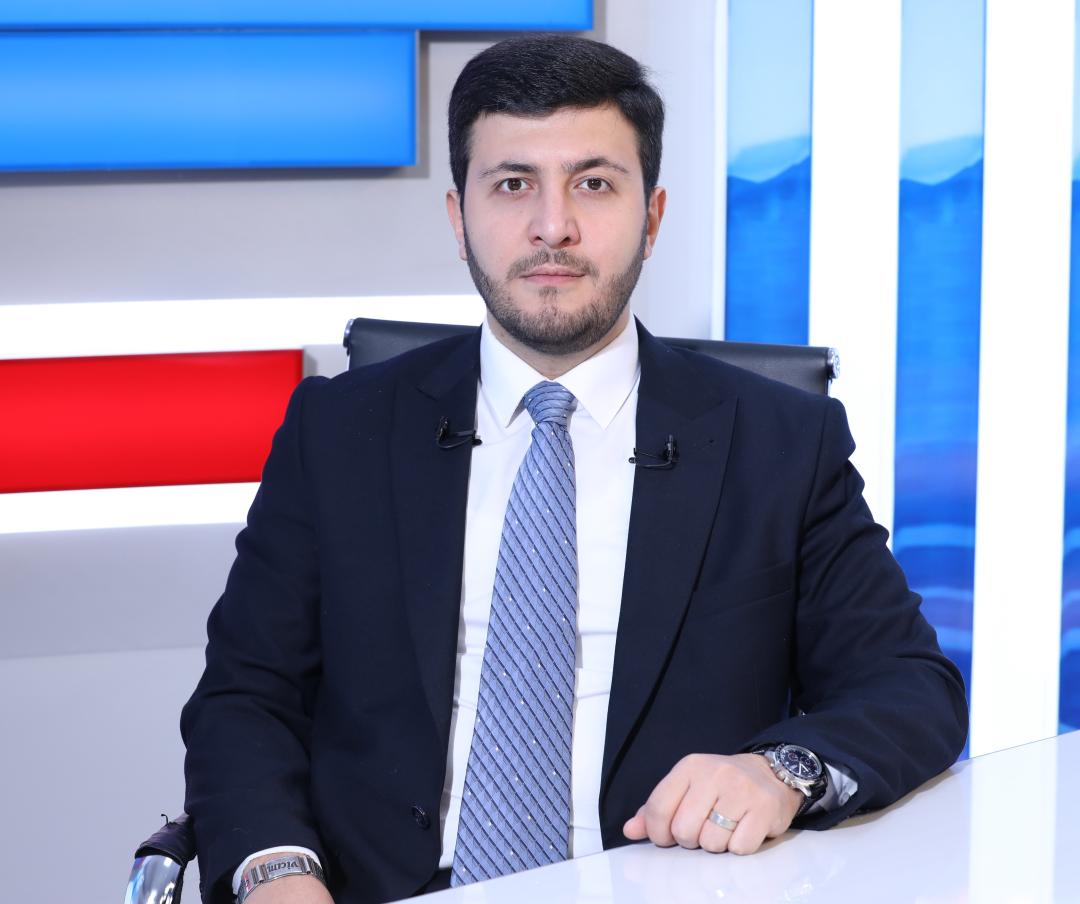
Areg Kochinyan: Could Armenia Reach Normalisation with Turkey Before Peace with Azerbaijan?

Areg Kochinyan is the president of the Research Center on Security Policy (RCSP), a Yerevan-based think tank focusing on security and foreign policy and funded primarily by the National Endowment for Democracy. In addition to policy development, the organisation is known to be a policy influencer with some authority in Armenian foreign policy planning. Mr Kochinyan's assertion that the normalisation of Yerevan's relations with Ankara could lead to a peace treaty with Baku is consequential.
Recently, Azerbaijani President Ilham Aliyev described Armenia as a "fascist" threat. Talks are at a low point. Mediation offers from the United States, the European Union, Georgia and Iran have been largely unsuccessful, with Baku favouring a bilateral framework for negotiations. It has been suggested that the normalisation of relations with Turkey could give new impetus to talks with Baku.
Special envoys from Armenia and Turkey have been holding direct talks since the summer of 2024. In November 2024, Turkish Foreign Minister Hakan Fidan reiterated that normalisation would follow a peace treaty between Armenia and Azerbaijan, not the other way around. Is this the end of the road?
As a second-track facilitator, you have argued in the past that a normalisation process with Turkey could methodically precede the conclusion of a peace treaty with Azerbaijan. Do you still hold this view at this stage?
Methodologically, yes, but the principle does not pass reality checks politically. The rationale for me is simple. As long as Azerbaijan knows that Turkey won't open the border before signing a peace treaty, the peace treaty cannot be concluded. Azerbaijan holds onto maximalist aspirations. Even if Baku gets most of what is demanded today, more will be added. Turkey has the key to reducing demands, changing the equilibrium of the conversation and enabling an agreement to be reached. Baku’s most significant leverage over Yerevan is the shut Armenian Turkish border. If we really want to have a peace treaty, we need to change the methodology of the current process, which would be the most meaningful change. Turkish normalisation first rather than second should be catalytic.
In November, Yerevan held normalisation talks with Turkey in Istanbul, where Foreign Minister Fidan reiterated the principle that normalisation would follow a peace treaty with Azerbaijan. Diplomats continued to talk in December, and communication between foreign ministers on the same agenda remained regular. If a peace treaty with Baku is the first step, what is there to discuss?
Two points to be made here. First, Armenia and Turkey hold technical talks so that whenever there is an Armenian-Azerbaijani agreement, normalisation with Turkey can follow within a couple of days. This is on issues of railway and high transport, for instance. So, the idea is to build towards that moment.
Then, there is a more subtle point. Let's say we are developing a process that retains the option of Turkey acting independently of Baku, given a different political context. That is possible with a third player, like the European Union. Turkey is negotiating to update and modernise its Customs Union with the Single Market. If this progress includes progress in “normalization” with Armenia—subtly, explicitly, but resolutely—then that would make a difference.
Do you believe that EU conditionality could reopen the door closed in November to normalise relations with Turkey ahead of a peace agreement with Azerbaijan?
Yes, that's right.
A few days ago, President Aliyev once again demanded the immediate opening of the transit route via Syunik, referred to as the Zangezur corridor. This has a precedent. In this case, he also explicitly said that Baku was no longer satisfied with relying on the Aras corridor via Iran. This is a more resolute proposition. Do you see this as a signal of escalation? What is the scope for Armenia to de-escalate?
Armenia has been trying to diffuse the situation for at least three years now. The official announcement from Yerevan regarding this pretty aggressive statement is the restatement of the “Crossroads of Peace” initiative, a proposition for open communication based on the principles of sovereignty, jurisdiction, equality, and reciprocity. And we've gone a little bit further this time. We have suggested that we are willing to create a special regime based on mutual concessions that will be unique to Armenia and Azerbaijan; this will tie Armenian communication to Syunik via Nakhichevan because it takes three times shorter time to travel from Yerevan from the south if one does not travel through the mountains. We can make progress if we can create this “transit reciprocity” for Azerbaijanis travelling to Nakhichevan and Armenians travelling to Syunik.
Is this something Baku seems willing to countenance?
Baku doesn't want reciprocity. For example, during the negotiation process, Armenia suggested having a third-party security guarantor—not the Russians—that could be a private military company or international organisation, on the condition that they would be engaged in both cases. Azerbaijan said this could only apply in Syunik.
Azerbaijan repeatedly raises the fact that its citizens fear contact with Armenian customs services. Armenia again proposed a “third-party” front desk and a customs back office for passport checks with reciprocity. Azerbaijan declined.
Essentially, we have a deadlock. Do you see President Aliyev’s statement as an ultimatum?
No. I think it’s an austere tone but not an ultimatum. And there is no deadlock. We are moving forward. Decoupling the peace treaty talks from the border delimitation and communication talks was a great success. When we have friction on one front, we keep progressing on others.
The peace treaty conversation continues. The Deputy Prime Minister will lead talks on demarcation by the end of the month. This brings us back to my original idea that this deadlock will be overcome whenever an Armenian Turkish breakthrough happens. That would reduce Baku’s leverage, and negotiations would gain momentum.
We have elections in Armenia in about a year's time, in 2026. Obviously, you want the government that you negotiate with to be the government that will ratify and implement the agreement, ideally. So the clock is ticking for both sides. Do you see any other external factors that will determine the timing of these negotiations?
We have one and a half years to wrap this up. Then there is Russia. Whenever Russia is done with their war in Ukraine, no matter which way it goes, it will have new time, resources, and no doubt additional resources to reengage. Any reengagement will constitute an escalation, and the peace objective will be much more elusive.
Even in the near future, if the newly elected President Donald Trump pays enough attention to this issue, it's low-hanging fruit that could yield a big win that Washington could step in and own. Washington could boast of ending a conflict with a century-old history within six months.
Washington usually delegates the region to an under-Secretary. Moreover, with the arrival of the Trump administration, the focus will be on Ukraine. The Caucasus will be a secondary issue at best. Do you feel that Washington has that level of commitment? How will that play out? Will Baku and Yerevan invite U.S. mediation?
I don't think that Yerevan and Baku need to invite Washington because negotiations between the two parties are already taking place in Washington. I am referring to the continuity of an existing diplomatic track with a new sense of political ambition. It's not principally anything new.
So, do you see people from the Trump administration picking up the mantle from the Biden Administration in this process?
Yes, this is happening. Another thing worth mentioning is that the Americans may be involved in delegating part of the resolution to Turkey. That would be a very cautious game, to ensure the process is not derailed. Theoretically, Turkey can play a more positive role in the South Caucasus: today more than ever before.
Do you think the current Turkish Government, with the incoming Trump Administration, will have the chemistry to do that? Right now, Washington's relationship with Ankara is not at its historical peak, to say the least.
This is a global phenomenon. Everyone is trying to get on the good side of the incoming Trump Administration. Because this administration is so unpredictable, this may yet happen.
Interview conducted by Ilya Roubanis
See Also


Irina Mamulashvili: Electoral Interference is a Playbook, not a Recipe

Giorgi Gakharia: The EU Should Engage Georgia Despite Its Democratic Backsliding

Peace or Capitulation? Shahverdyan on Armenia-Azerbaijan Agreement and the Nagorno-Karabakh Crisis

Ali Mousavi Khalkhali: Iran Will Avoid Conflict in the Caucasus

